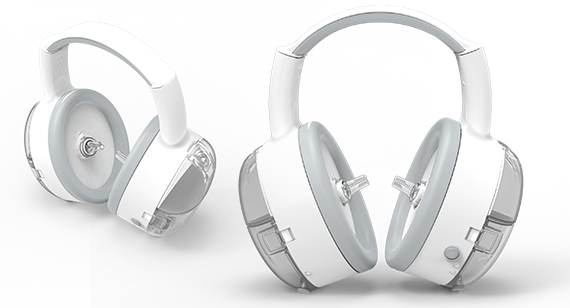
Clinical Trials Judge Innovative Ear-Care Device to be Sound
Protolabs’ Cool Idea Award grant helps Tucson startup meet customization requirements during device’s trial stage

A new ear-care medical device from Tucson-based SafKan will professionally clean a patient’s ear in just 35 seconds. The startup company recently developed the first and only automated ear-wax removing headphones for clinical use called OtoSet, which was in response to a growing market demand. Every year more than 12 million Americans visit their physicians for impacted earwax removal, which occurs when enough earwax accumulates to cause symptoms such as pain, fullness, itching, odor, tinnitus, discharge, cough, or hearing loss.
With help from Protolabs’ Cool Idea Award, which included in-kind machining and industrial-grade 3D printing services, SafKan was able to successfully meet various customization requirements during OtoSet’s pivotal trial stage.
The headphones have disposable silicone nozzles that spray a warm saline solution against the walls of the ear canal while extracting the solution and wax back into the nozzles and disposable outflow containers, avoiding messy spills. For now, Otoset can only be administered by health care providers.
“It’s pretty easy to design headphones on your computer and 3D print it,” said co-founder Sahil Diwan. “But then you need to take that to the next level and start to commercialize it. Protolabs has been really helpful with our engineering team, using experience that we don’t have in-house to get our device ready to go to market.”


Since completing two clinical trials, OtoSet is slated to be introduced soon in a beta program in several cities including Seattle, San Francisco, Los Angeles, Tucson, Houston, and Philadelphia. With help from the Cool Idea Award, SafKan has developed functional prototypes that are now being tested by more than 50 physicians across the country.
Cofounded by brothers Sahil and Aadil Diwan, OtoSet went through several iterations, made possible by the team at Protolabs. SafKan relied on the grant to remove the financial burden from the clinical trials to quickly place working prototypes in the hands of physicians.
“Without this grant, it would take more time,” said Sahil. “This allows us to build these devices and have them be like the real deal and get them to physicians quickly.”
The Diwan brothers turned to Protolabs’ expertise in Polyjet 3D printing and CNC machining, using 14 unique parts from the digital manufacturer. Once made, the parts for multiple devices were shipped to Tucson, Arizona, where they are assembled and tested by SafKan.
As mentioned, Otoset is only available to medical professionals for now, but the company plans to expand into the consumer market in the near future.






